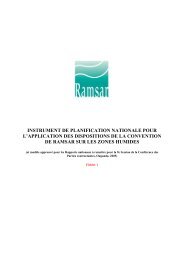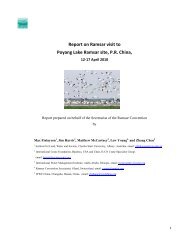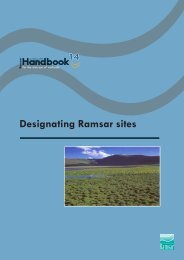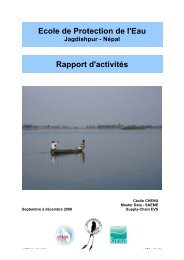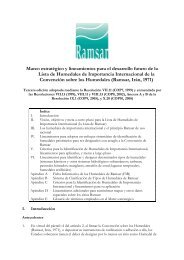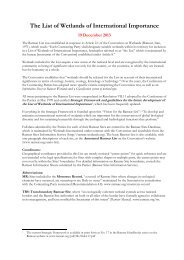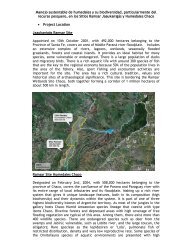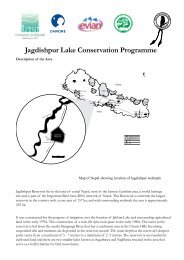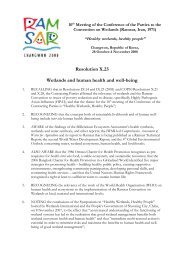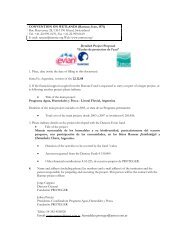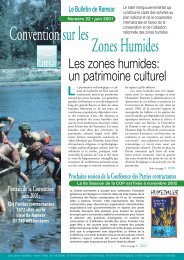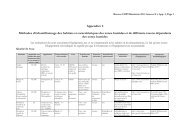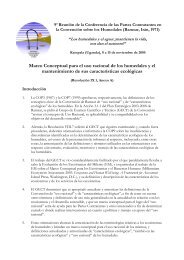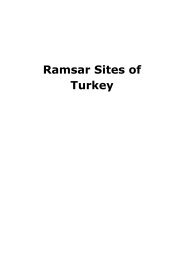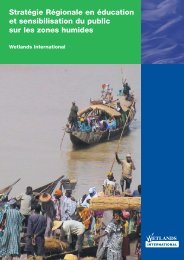Okavango Delta Management Plan - Ramsar Convention on Wetlands
Okavango Delta Management Plan - Ramsar Convention on Wetlands
Okavango Delta Management Plan - Ramsar Convention on Wetlands
Create successful ePaper yourself
Turn your PDF publications into a flip-book with our unique Google optimized e-Paper software.
Table 3-2: Priority issues to be addressed during the implementati<strong>on</strong> of the plan<br />
No. Comp<strong>on</strong>ent Key issues<br />
1 Policy, planning and<br />
strategy<br />
2 Dialogue,<br />
communicati<strong>on</strong> and<br />
networking<br />
3<br />
Research, data<br />
management and<br />
participatory planning<br />
4 Hydrology & water<br />
resources<br />
5 Wildlife management<br />
6 Sustainable tourism<br />
and CBNRM<br />
1.1 There is need to establish a DEA office in Ngamiland and strengthen its capacity to coordinate and<br />
m<strong>on</strong>itor the implementati<strong>on</strong> of the ODMP.<br />
1.2 There is need to harm<strong>on</strong>ize legislati<strong>on</strong> and policies applicable to the ODRS.<br />
1.3 There is need to ensure that plans, programmes and development activities in the ODRS are guided<br />
by a comm<strong>on</strong> and shared visi<strong>on</strong> for the ODRS.<br />
1.4 There is need to facilitate the approval of Draft Nati<strong>on</strong>al <strong>Wetlands</strong> Policy and Strategy by Parliament.<br />
1.5 There is need to establish the n<strong>on</strong>-use ec<strong>on</strong>omic values for the ODRS<br />
2.1 There is need to establish effective communicati<strong>on</strong> am<strong>on</strong>gst stakeholders at all levels.<br />
2.2 Cross-cutting issues such as HIV/AIDS, Gender and Poverty need to be mainstreamed into the<br />
ODMP process<br />
3.1 Difficulties in obtaining, updating and accessing existing informati<strong>on</strong> for resource planning and<br />
management in the ODRS need to be addressed.<br />
3.2 Uncertainties about stakeholders c<strong>on</strong>tinuing to meaningfully participate in the implementati<strong>on</strong> of the<br />
ODMP need to be addressed.<br />
3.3 Research in the ODRS needs to be coordinated.<br />
4.1 The need to manage channel blockages to sustain communities access to livelihood activities<br />
4.2 Water quality and sedimentati<strong>on</strong> m<strong>on</strong>itoring needs to be improved<br />
4.3 There is need to c<strong>on</strong>tinue to engage Namibia and Angola in the sustainable use of the <str<strong>on</strong>g>Okavango</str<strong>on</strong>g><br />
River Basin.<br />
5.1 The human/wildlife c<strong>on</strong>flicts c<strong>on</strong>tinue to be a problem and need to be addressed.<br />
5.2 There is need to carry out baseline surveys <strong>on</strong> keyst<strong>on</strong>e species.<br />
5.3 The limited awareness of the ecological impacts of tourism activities in the ODRS need to be<br />
addressed.<br />
5.4 Lake Ngami needs to be declared a bird sanctuary<br />
5.5 The existing and potential breeding sites for slate egret need to be protected.<br />
6.1 There is need to address the possible impacts of tourism activities <strong>on</strong> the ODRS ecosystem.<br />
6.2 The level of citizen participati<strong>on</strong> in the tourism sector needs to be improved.<br />
6.3 The tourism products need to be diversified from being wildlife based to other areas.<br />
6.4 There is need to build the capacity of communities for delivering management and sustainable use<br />
of natural resources<br />
No. Comp<strong>on</strong>ent Key issues<br />
7 Sustainable fisheries 7.1 Manpower capacity of the fisheries divisi<strong>on</strong> needs to be addressed<br />
utilizati<strong>on</strong> & 7.2 The inadequacy of base line data <strong>on</strong> fish stocks in the ODRS needs to be addressed.<br />
management 7.3 The l<strong>on</strong>g standing problem of fisheries c<strong>on</strong>flicts need to be resolved.<br />
8 Vegetati<strong>on</strong> resources 8.1 There is need to reduce the impact and frequency of unc<strong>on</strong>trolled veld fires.<br />
management<br />
8.2 Vegetati<strong>on</strong> degradati<strong>on</strong> by wildlife needs to be assessed<br />
8.3 Overgrazing by livestock needs to be addressed<br />
8.4 Sustainable use of veld products need to be addressed<br />
9 Settlement<br />
development<br />
planning<br />
9.1 Capacity to m<strong>on</strong>itor infrastructural developments needs to be improved.<br />
10 Sustainable land-use 10.1 Haphazard and delays in land allocati<strong>on</strong>s as well as poor record keeping need to be reduced.<br />
10.2 Traditi<strong>on</strong>al access rights to natural resources in c<strong>on</strong>cessi<strong>on</strong> areas need to be upheld.<br />
10.3 The level of inspecti<strong>on</strong>s to ensure adherence to lease c<strong>on</strong>diti<strong>on</strong>s need to be improved<br />
11 Waste management 11.1 The solid waste collecti<strong>on</strong> services within the ODRS need to be improved.<br />
11.2 The solid and liquid waste infrastructure in the district needs to be improved.<br />
11.3 The instituti<strong>on</strong>al capacity of the district waste management needs to be improved<br />
12 Livestock<br />
12.1 The livestock/wildlife interacti<strong>on</strong>s need to be reduced.<br />
<str<strong>on</strong>g>Management</str<strong>on</strong>g> 12.2The risk of Tsetse re-infestati<strong>on</strong> needs to be reduced.<br />
3.7.2.2 Development of thematic areas for integrated management planning<br />
In order to move away from sectoral planning to integrated management planning,<br />
the analysis in this secti<strong>on</strong> dem<strong>on</strong>strates the inherent need for inter-sectoral<br />
interventi<strong>on</strong>s to address the priority issues during the <str<strong>on</strong>g>Plan</str<strong>on</strong>g> implementati<strong>on</strong>.<br />
To facilitate this process, a further analysis was carried out <strong>on</strong> the issues with<br />
regards to the type of management interventi<strong>on</strong>s required. The analysis revealed<br />
that the issues fell into three broad areas. These areas were management, natural<br />
resources base and natural resources use and these required instituti<strong>on</strong>al, biophysical<br />
and socio-ec<strong>on</strong>omic approaches in their interventi<strong>on</strong> respectively. For<br />
94



